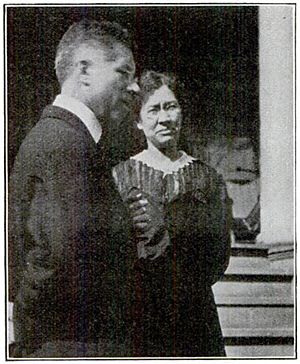Lugenia Burns Hope facts for kids
Quick facts for kids
Lugenia Burns Hope
|
|
|---|---|

John and Lugenia Burns Hope
|
|
| Born | February 19, 1874 |
| Died | August 14, 1947 (aged 76) Nashville, Tennessee, United States
|
| Occupation | Political activist |
| Spouse(s) | John Hope |
Lugenia Burns Hope (born February 19, 1871, died August 14, 1947) was a very important social reformer. She worked hard to make life better for African Americans in Atlanta, Georgia. Her group, the Neighborhood Union, and other community projects she started, became a great example for the Civil Rights Movement that came later.
Contents
About Lugenia Burns Hope
Early Life and Education
Lugenia Burns was born in St. Louis, Missouri, on February 19, 1871. Her father, Ferdinand Burns, was a carpenter. She was the youngest of seven children. When her father passed away suddenly, her mother moved the family to Chicago.
From a young age, Lugenia Burns worked with different charity groups. This sparked her lifelong interest in helping others. Between 1890 and 1893, she studied at the Art Institute of Chicago, the Chicago School of Design, and the Chicago Business College.
Starting the Neighborhood Union
In 1897, Lugenia Burns married John Hope. They moved to Atlanta when he became a teacher at Atlanta Baptist College, which is now Morehouse College. He later became the college president in 1906.
Lugenia Hope wanted to help the community around the college. With the help of Morehouse students, she asked local families what they needed. This led to the college offering day care, kindergarten, and fun activities.
Because of her strong community involvement, she started the Neighborhood Union in 1908. This was the first social welfare group in Atlanta run by African American women. It offered many services, like medical care, job help, and education. The Neighborhood Union was known for building strong communities and fighting for equal rights for all people. Hope led the group's Board of Managers until 1936.
Working for Change
Lugenia Hope was a founding member of the Atlanta branch of the National Association of Colored Women's Clubs. She worked on reform projects all over the country. For example, in 1920, she tried to end segregation within the national YWCA. Segregation meant keeping Black and white people separate, and it was unfair.
She told white women who did not want full equality for African American women in the YWCA: "Ignorance is ignorance wherever found, yet the most ignorant white woman may enjoy every privilege that America offers. Now ...the ignorant Negro woman should also enjoy them."
Lugenia Hope had new ideas about racial equality. She did not believe that African Americans needed to prove they deserved to be treated as equal citizens. As the vice president of the National Association for the Advancement of Colored People (NAACP) in Atlanta, she organized special six-week courses. These classes taught people about voting, democracy, and the U.S. Constitution. This important work was later copied across the country. These classes became an early part of the Civil Rights Movement.
Later Life and Legacy
Lugenia Hope became ill in 1936, the same year her husband passed away. She spent her last years living in New York City, Chicago, and Nashville, Tennessee. She died on August 14, 1947, in Nashville. Her ashes were spread from the tower at Morehouse College.
In 1996, Lugenia Burns Hope was honored by being added to the Georgia Women of Achievement. Her work helped lay the groundwork for a more equal society.
 | Bayard Rustin |
 | Jeannette Carter |
 | Jeremiah A. Brown |

